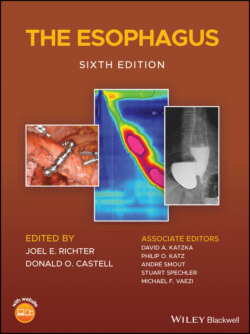Читать книгу The Esophagus - Группа авторов - Страница 24
Odynophagia
ОглавлениеThe word odynophagia comes from the Greek words odyno (pain) and phagia (to eat) and is pain upon swallowing. The pain is usually felt in the mouth, throat, or chest and is most often described as an aching, burning, or, in some instances, sharp stabbing pain. Pain may or may not occur with concomitant difficulty swallowing. The presence of odynophagia suggests an esophageal mucosal injury, often due to pill‐induced or infectious esophagitis.
Table 1.4 Common etiologies of pill esophagitis.
| Nonsteroidal anti‐inflammatory medications (NSAIDs) Aspirin Potassium chloride (KCl) Bisphosphonates Quinidine Iron compounds AntibioticsTetracycline/DoxycyclineClindamycin |
The most common medications implicated in pill‐induced esophagitis are listed in Table 1.4. Pill esophagitis occurs more often in the young or the elderly and often produces one or more discreet esophageal ulcers with normal surrounding mucosa. Commonly, the site of the ulceration is at the junction of the proximal and mid esophagus, where the amplitude of esophageal contraction is lower, and where the aortic arch naturally extrinsically compresses the esophagus. At this location, caustic contents in the medication may come in contact with the esophageal mucosa [24]. One retrospective chart review of patients with pill esophagitis reported that 75% presented with odynophagia [17]. Patients taking medications that are known to carry a higher risk of esophagitis should be told to take their medications with plenty of water and not to lie flat soon after medication administration.
Patients with infectious esophagitis often present with odynophagia. This is especially common in patients with viral esophagitis, such as herpes simplex virus and cytomegalovirus. Among fungal causes of esophagitis, while Candida species are the most common, other infections such as cryptococcosis, histoplasmosis, and aspergillus have also been described [25]. HIV patients may also develop idiopathic esophageal ulcers, which cause significant odynophagia. Patients with infectious esophagitis are often immunosuppressed, and a new diagnosis in the absence of a known immunocompromised status warrants further investigation.
